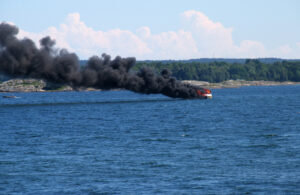The Threat of Recreational Boat Fires in Canada
Recreational boating is a popular pastime in Canada, with our vast lakes and extensive coastline offering endless opportunities for adventure and relaxation. However, the enjoyment of these activities comes with inherent risks, one of the most significant being the threat of boat fires. Incidents have highlighted the devastating potential of such fires, often stemming from equipment malfunctions, human error, and environmental factors. Understanding the causes and implementing robust safety measures are crucial to safeguarding lives and property, minimizing boat fires and that boating remains a safe and enjoyable activity for all.
The SS Noronic disaster: A tragic chapter in Canadian boat history
On September 17, 1949, Toronto Harbour witnessed the most catastrophic recreational boat fire in Canadian history. The SS Noronic disaster, a passenger ship caught fire, leading to the tragic deaths of 119 people. The rapid spread of the flames, fuelled by the ship’s highly flammable interior and a delayed response, resulted in a high casualty rate. Many passengers, trapped in their cabins, were unable to escape the intense flames and thick smoke.
Key prevention measures for recreational boat fires recreational boats
Follow 5 key safety measures to prevent boat fires:
- Regular maintenance and inspections
Ensure all electrical systems, fuel lines, and engines are routinely checked and maintained to prevent malfunctions that could cause fires. - Fire suppression systems
Install and maintain fire suppression systems, such as automatic extinguishers in engine compartments and smoke detectors throughout the boat. - Fire extinguishers
Equip boats with easily accessible fire extinguishers and train crew and passengers where they are located and how to use the equipment. - Escape routes
Design clear, accessible escape routes. Regularly drill crew and passengers on emergency procedures and ensure exits are unobstructed. - Proper storage of flammable materials
Store flammable materials like gasoline and propane in designated, well-ventilated areas away from heat sources. - Safety education
Provide safety education for all passengers, including fire prevention tips and emergency response actions.
Emergency communication equipment
Equip boats with reliable communication devices to quickly call for help in case of an emergency. Key emergency communication equipment for a recreational boat includes:
- VHF radio: A marine VHF (Very High Frequency) radio is essential for communication with other boats, marinas, and rescue services. It is the primary means of communication for distress signals and routine messages. In Canada, you need a license to operate a VHF radio on a boat. The license is known as the Restricted Operator Certificate (Maritime) (ROC(M)), issued by the Canadian Power and Sail Squadrons. This certification ensures that operators understand the proper procedures and protocols for using marine radios for operation, channels, distress signals, and phonetic alphabet.
- EPIRB (Emergency Position Indicating Radio Beacon): An EPIRB sends a distress signal with the boat’s location to search and rescue satellites, ensuring help can find the vessel even if the crew cannot communicate.
- PLB (Personal Locator Beacon): Like an EPIRB, a PLB is a portable device carried by individuals. It sends a distress signal to search and rescue services, providing the location of the person in need.
- Satellite phone: A satellite phone provides reliable communication, especially in remote areas where traditional cell phone coverage is unavailable.
- Handheld VHF radio: A portable VHF radio can be a backup to the fixed VHF radio, useful for communication during emergencies when moving around the boat.
- Signal flares: Visual distress signals such as hand-held flares, parachute rockets, and smoke signals help attract the attention of nearby boats and aircraft.
Recent recreational boat fires in Canada
June 2022: Yacht fire in British Columbia
In June 2022, a yacht fire in British Columbia, caused by an electrical fault, rapidly spread and caused extensive damage. Thankfully, all passengers were safely evacuated, and no injuries were reported.

2021: Speedboat fire in Ontario
In 2021, a speedboat in Ontario caught fire due to a fuel leak while docked. The quick actions of nearby boaters and emergency services contained the fire, preventing it from spreading to other vessels.
Make the 2024 boat season in Canada a safe one but brushing up on your safety protocols related to boat fires.
Understanding and adhering to safety protocols is paramount to reducing the risk of recreational boat fires play a crucial role in safeguarding lives and property on the water. By prioritizing safety education and preparedness, boaters can significantly minimize the occurrence and impact of fires, ensuring a secure and enjoyable experience for all. The lessons from past incidents and the proactive implementation of these measures can make a substantial difference, allowing the beauty and adventure of boating to be enjoyed without compromising safety.
Resources for boat fire safety
Safe Harbour Insurance: Boat Safety Tips
Transport Canada: Marine Safety
National Fire Protection Association (NFPA): Safety tip sheets
BoatUS Foundation – Fire Safety
Canadian Coast Guard: Services and Emergency